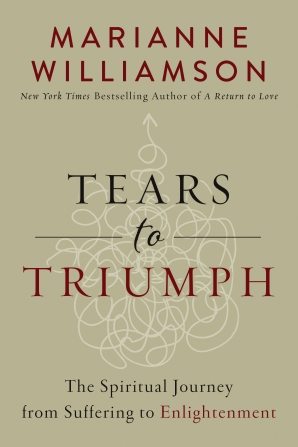
All of us yearn for happiness and love, and sometimes we find it. Yet most of us are visited at some point by sorrow as well. A relationship, a job, a particular circumstance brought us happiness—but then something went wrong. At other times, we can’t put our finger on why, but we feel no happiness and we feel no love.
Life, in fact, is not always easy, and dwelling gracefully within the space of deep sorrow can be very hard. Emotional torment, overwhelming grief, physical agony, screams from the very depths of our souls—why is such suffering a part of our experience? What does it mean? And how can we survive it and even transcend it?
A spiritual worldview does not skirt such questions; rather, it responds to them. In fact, these questions are at the heart of all great religious teachings, ranging from Buddha’s first encounter with suffering when he left his father’s royal compound, to the suffering of the Israelites when they were slaves under Pharaoh and when they wandered through the desert, to Jesus’s suffering on the cross. The universal spiritual truths at the core of great religious teachings are a balm for the heart sent straight from the Mind of God.
Ironically, these truths are often more obscured than revealed by organized religion, concealing the extraordinary powers of comfort and inspiration they are meant to provide. This book seeks to reveal those principles, for they are coded messages pointing not only to the source of our suffering, but also to its healing.
Healing the heart is in fact God’s specialty. Spirit reorders our thinking upon our request, in so doing bringing peace to our hearts. Inner peace does not emerge from an intellectual shift, but from a spiritual process that affects both body and soul. This shift is produced by a divine intercession that is far from metaphorical, as we align our thoughts with those of God.
Theology alone does not bring comfort. But spiritual principles, when practically applied, are gateways to inner peace. My book, Tears to Triumph, is about turning these principles into an alchemical brew of personal transformation, using the insights of great religious truths to assuage the pain that is a part of being human.
Simply waking up in the morning and going through the daily routines of a normal existence can be emotionally or even physically burdensome. Excruciating pain can weigh upon the heart for months or even years, obliterating all joy and making the slightest comforts impossible. Traumatic memories can cut the psyche like razors. Suffering can overwhelm all else, and even if we think there is a God, He can seem at such moments like He is very far away.
But God is never far away, because God is in our minds. We are free to think whatever we wish to think. The door to emotional deliverance is primarily a mental one. By aligning our thoughts with His thoughts, we can awaken to Him in the midst of our suffering.
We can find Him in the midst of our darkness. And we can walk with Him into the light that lies beyond. The universe is wired for God’s light the way a house is wired for electricity, and every mind is like a lamp. But a lamp must be plugged in for it to shed any light.
[Tweet “With every prayer, we plug in to the light. @MarWilliamson”]. With every realization of our mistakes and willingness to atone for them, we plug in to the light. With every apology we give and receive, we plug in to the light. With every act of forgiveness, we plug in to the light. With every five minutes of meditation, we plug in to the light. With every thought of mercy, we plug in to the light. With every moment of faith, we plug in to the light.
The search for God is a search for light, and outside that light we are sorrowful indeed. Within it, we are healed and made whole.
Falling into a Deep, Dark Valley
I know something about suffering, as twice I’ve been diagnosed as clinically depressed. I’ve also experienced  personal tragedy and the deaths of loved ones. I’ve suffered through devastating betrayals and disappointments. I’ve felt on more than one occasion that I had lost any chance of happiness I might have ever had. I’ve been up close and personal with suffering, not only in my own life, but also in the lives of many others in the course of my career. Nothing gives you x-ray vision into the suffering of others like having suffered yourself. I know the face of depression and I know it well.
personal tragedy and the deaths of loved ones. I’ve suffered through devastating betrayals and disappointments. I’ve felt on more than one occasion that I had lost any chance of happiness I might have ever had. I’ve been up close and personal with suffering, not only in my own life, but also in the lives of many others in the course of my career. Nothing gives you x-ray vision into the suffering of others like having suffered yourself. I know the face of depression and I know it well.
As someone who has always viewed things through a mystical lens—even before I really understood what that meant—I’ve always seen events in my life in the context of a spiritual journey. I’ve viewed painful times in my life as part of a mysterious unfolding, as dark nights of my soul for which, no matter how devastating, I needed to be fully present. However deep my suffering, I didn’t want to be anesthetized as I went through it. Like an expectant mother who wants to give birth naturally, rejecting drugs during labor because she wants to experience “natural childbirth,” I wanted to be fully available to the depths of my pain. Why? Because I knew it had something to teach me. I knew that somehow, in some way, my suffering would lead to a blazing new dawn in my life—but only if I was willing to endure the deep, dark night preceding it.
None of this is to romanticize suffering. Sleepless nights, obsessive thoughts, extreme mental and emotional pain are nothing to view lightly. But my journeys through deep sadness have ultimately shown me as much about light as they have about darkness—for in coming to understand my suffering, I’ve come to understand myself more deeply.
On the other side of my suffering, I’ve seen things that I wouldn’t have seen otherwise. I’ve seen ways I have contributed to my own disasters. I’ve seen that love isn’t a game and that it should be taken seriously. I’ve seen that other people’s feelings are as important as my own. I’ve seen that external things are not what matter. I’ve seen that life lived with any purpose but love is a life that will lead to sorrow. I’ve seen that love is more powerful than evil. I’ve seen that nothing but the love of God can be guaranteed.
And I’ve seen that life does indeed go on.
TEARS TO TRIUMPH by Marianne Williamson, reprinted with permission from HarperOne, an imprint of HarperCollins Publishers, copyright 2016.



